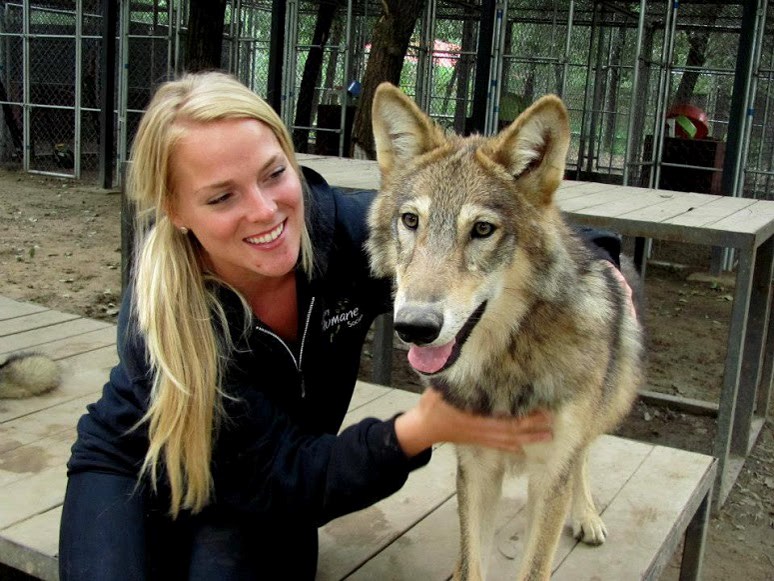It’s little wonder that wolves are a go-to symbolic device in highly dramatic film and television: they’re mysterious; they’re stoic; they’re dangerous; their eyes are pools of wisdom and wonder.
But in order for a single wolf to appear on screen – be it in Game of Thrones, Once Upon a Time, or The Revenant – a team of humans must dedicate thousands of hours to building a bridge of trust between the species.
Annika McDade is one such human who has forged relationships with wolves that work in the film and television industry. The Vancouver-based canine behaviour consultant spent two years in China and Mongolia working with internationally acclaimed wolf guru Andrew Simpson and his packs of rescued wolves.
McDade was drawn to wolves by way of her passion for dogs (“From a very young age, I was obsessed with dogs to a fault,” she chuckles in a recent phone interview. “In social settings, when I was a kid, I would pretend to be a dog”). She was invited to work under Simpson after screening Wolves Unleashed, a documentary about his work, and emailing him over several months “telling him [in each message], ‘If you ever need a volunteer to clean up poo, I will do it.’”
The wolves in Simpson’s care were first-generation captive wolves that were rescued from a bad breeding program at a Mongolian zoo and nurtured into film and television industry work. The litters arrived at two weeks old and were bottle-fed by Simpson; McDade’s task upon arrival on the scene was to build up the confidence required to forge a relationship with animals that, although the same species as dogs, differ from their domesticated counterparts in significant ways.
“Instinctively, dogs learn to be happy around, enjoy the company of, and trust people, unless they’ve experienced something that made them feel otherwise, but the wolves’ instinct is quite the opposite,” says McDade. “You have to teach them that they have a reason to trust and enjoy our company, and that can take a really long time with wolves, depending on their lineage and how far domesticated or wild they are.”
McDade says her work with wolves – which began with her just sitting in their pens and allowing them to smell her and check her out – was humbling. “Being in their space, you can’t hide anything of yourself. You have to be confident. If you’re not, they know it, and it becomes quite dangerous to be around them if you’re not confident. When you get scared, they get scared, and their instinct is to make you leave.”
But in McDade’s case, the trust-building was wholly successful, and key to compelling wolves to bring it for the camera. “If we’re going to take them to a movie set in the grasslands and ask them to come when we call in front of 15 cameras and 100 crew members, these are basically wild animals, so they have to like me enough to do that because I asked, not because they had to,” says McDade.
Simpson’s wolves work all around the world under the banner of his company Instinct Animals; credits include the aforementioned hits Game of Thrones, Once Upon a Time, and The Revenant. McDade – who worked with wolves on Wolf Totem, which filmed in China and Mongolia, and with Great Pyrenese dogs on Belle et Sebastien, which filmed in Europe – says Simpson does the films that nobody thinks can be done with real wolves. “These wolves are very well loved and catered to and they’re not looked at as something that makes people money,” says McDade. “These are life partners to the people who take care of them. They’re treated better than most family pets would be in terms of the quality of care and the time they’re given and the patience and the enclosures and the life enrichments.”
These days, McDade trains domesticated dogs through her Vancouver-based company Canine Connection Training. Her stated passion is working with owners to “teach their dog new behaviours that are incompatible to the bad ones.”
“Generally speaking, behaviour concerns with dogs are a product of poor environmental influences during the imprint period under the age of six months, like a trauma, or genetics,” says McDade. “And then of course, us people can really mess up completely sound dogs by not understanding how to communicate with them, and a lot gets lost in translation.”
Learn more about Annika McDade’s Canine Connection Training at http://canineconnectiontraining.ca.
QUICK TIPS FOR DOG OWNERS FROM ANNIKA MCDADE
A tired dog is a happy dog: “A well exercised, well engaged with, and social dog is a tired dog, and a tired dog is a happy dog. Especially in an urban setting. A lot of the problems come from the fact that we don’t stimulate our dogs enough, or we try to stimulate them in places that they don’t actually like. Taking a dog who is scared of dogs to a dog park isn’t going to make them tired and happy. It’s going to make them reactive and scared.”
Get professional help: “Rather than getting frustrated with your pet when they’re not doing something you want them to do, try to figure out why they’re doing it, and that might mean having to enlist professional help to figure out why the dog is behaving the way they are. The instinct of people is to fix problems in a way that actually manifests them in the dog world. There’s no shame in asking for help. There are actually trainers who will offer reading material for free just to help. I’m one of those people.” McDade recommends that owners hire dog trainers who practice force-free positive reinforcement (“It's really important that people look for science-based educators”).
Best dog-friendly locales around Vancouver: “Pacific Spirit. Spanish Banks. North Shore Mountains.”


